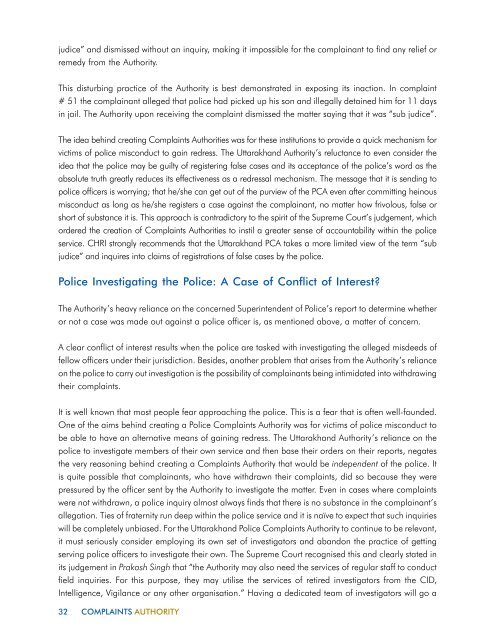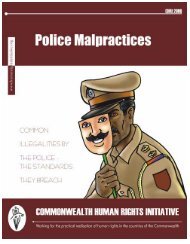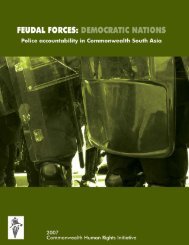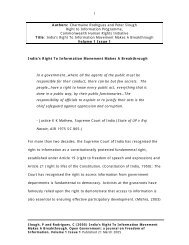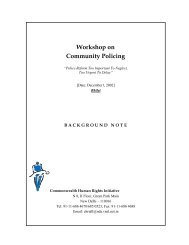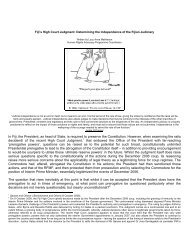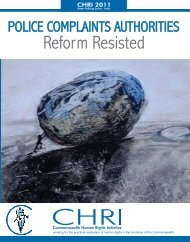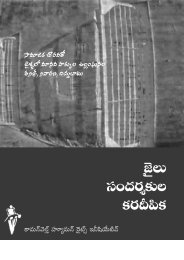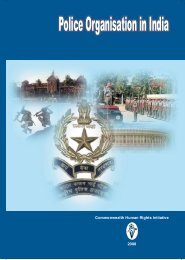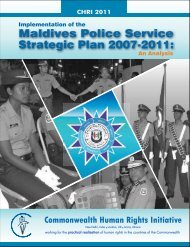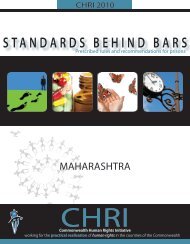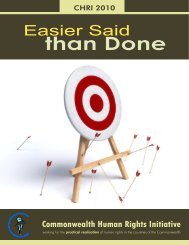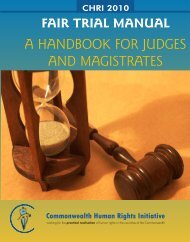Uttarakhand State Police Complaints Authority - Commonwealth ...
Uttarakhand State Police Complaints Authority - Commonwealth ...
Uttarakhand State Police Complaints Authority - Commonwealth ...
Create successful ePaper yourself
Turn your PDF publications into a flip-book with our unique Google optimized e-Paper software.
judice” and dismissed without an inquiry, making it impossible for the complainant to find any relief orremedy from the <strong>Authority</strong>.This disturbing practice of the <strong>Authority</strong> is best demonstrated in exposing its inaction. In complaint# 51 the complainant alleged that police had picked up his son and illegally detained him for 11 daysin jail. The <strong>Authority</strong> upon receiving the complaint dismissed the matter saying that it was “sub judice”.The idea behind creating <strong>Complaints</strong> Authorities was for these institutions to provide a quick mechanism forvictims of police misconduct to gain redress. The <strong>Uttarakhand</strong> <strong>Authority</strong>’s reluctance to even consider theidea that the police may be guilty of registering false cases and its acceptance of the police’s word as theabsolute truth greatly reduces its effectiveness as a redressal mechanism. The message that it is sending topolice officers is worrying; that he/she can get out of the purview of the PCA even after committing heinousmisconduct as long as he/she registers a case against the complainant, no matter how frivolous, false orshort of substance it is. This approach is contradictory to the spirit of the Supreme Court’s judgement, whichordered the creation of <strong>Complaints</strong> Authorities to instil a greater sense of accountability within the policeservice. CHRI strongly recommends that the <strong>Uttarakhand</strong> PCA takes a more limited view of the term “subjudice” and inquires into claims of registrations of false cases by the police.<strong>Police</strong> Investigating the <strong>Police</strong>: A Case of Conflict of Interest?The <strong>Authority</strong>’s heavy reliance on the concerned Superintendent of <strong>Police</strong>’s report to determine whetheror not a case was made out against a police officer is, as mentioned above, a matter of concern.A clear conflict of interest results when the police are tasked with investigating the alleged misdeeds offellow officers under their jurisdiction. Besides, another problem that arises from the <strong>Authority</strong>’s relianceon the police to carry out investigation is the possibility of complainants being intimidated into withdrawingtheir complaints.It is well known that most people fear approaching the police. This is a fear that is often well-founded.One of the aims behind creating a <strong>Police</strong> <strong>Complaints</strong> <strong>Authority</strong> was for victims of police misconduct tobe able to have an alternative means of gaining redress. The <strong>Uttarakhand</strong> <strong>Authority</strong>’s reliance on thepolice to investigate members of their own service and then base their orders on their reports, negatesthe very reasoning behind creating a <strong>Complaints</strong> <strong>Authority</strong> that would be independent of the police. Itis quite possible that complainants, who have withdrawn their complaints, did so because they werepressured by the officer sent by the <strong>Authority</strong> to investigate the matter. Even in cases where complaintswere not withdrawn, a police inquiry almost always finds that there is no substance in the complainant’sallegation. Ties of fraternity run deep within the police service and it is naïve to expect that such inquirieswill be completely unbiased. For the <strong>Uttarakhand</strong> <strong>Police</strong> <strong>Complaints</strong> <strong>Authority</strong> to continue to be relevant,it must seriously consider employing its own set of investigators and abandon the practice of gettingserving police officers to investigate their own. The Supreme Court recognised this and clearly stated inits judgement in Prakash Singh that “the <strong>Authority</strong> may also need the services of regular staff to conductfield inquiries. For this purpose, they may utilise the services of retired investigators from the CID,Intelligence, Vigilance or any other organisation.” Having a dedicated team of investigators will go a32 COMPLAINTS AUTHORITY


